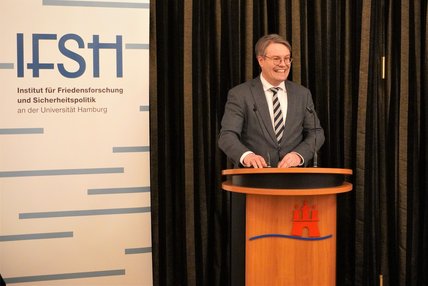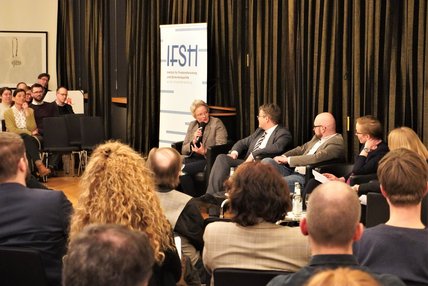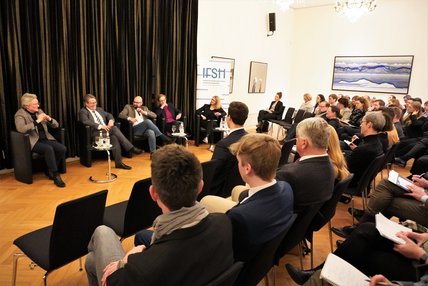
For the first time, Germany will have a National Security Strategy. The strategy, which is stipulated in the coalition agreement of the federal government, will outline how Germany will position itself in terms of security internally and externally in the future. The upcoming publication of this strategy was the occasion for IFSH to invite guests to a high-level discussion event at the Hamburg State Representation in Berlin on February 27th. Around 80 guests attended the event and listened with interest to the experts' presentations. Moderated by Anja Dahlmann, the head of the IFSH office in Berlin, the experts examined the project from various perspectives.
Dr. Tobias Lindner, State Secretary in the Federal Foreign Office, delivered a keynote speech in which he provided insights into the creation process of the strategy and its content focus. He referred to three central dimensions of security that the strategy will depict: the security of life, freedom, and livelihoods. Lindner emphasized the value of arms control, among other things. The State Secretary explained that it must be thought of as complementary to defense capability and warned not to lose sight of disarmament and arms control. This applies, for example, to nuclear weapons, hypersonic weapons, and autonomous weapon systems.

Almut Möller, State Councillor and Commissioner of the Free and Hanseatic City of Hamburg to the Federal Government, the European Union, and for Foreign Affairs, emphasized the need to involve the federal states in the implementation of the National Security Strategy. A strategy that follows the concept of integrated security must take into account not only policy areas but also different levels of decision-making.
IFSH Director Prof. Dr. Ursula Schröder discussed success criteria for implementation, including how Finland takes them into account. It is especially important, according to the peace researcher, that clear goals are accompanied by appropriate structures, instruments, and resources.

Philipp Rotmann, Director of the Global Public Policy Institute, addressed questions regarding how to deal with systemic competition and the relationship between values-based foreign policy and multilateralism.
Finally, the panel took questions from the audience.